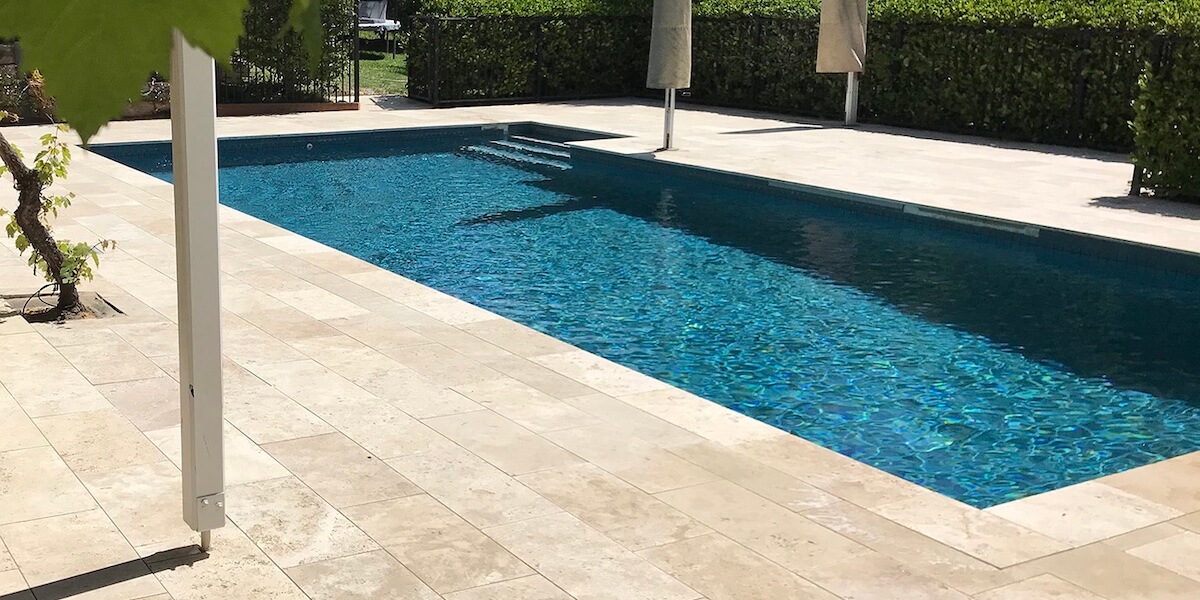You may have come across countless blogs about pool designs, themes and overall layout. However, a few guide you in making one important decision about your pool; whether to choose a saltwater or chlorine pool. Though both types of pools are popular in Sydney, they work differently and come with unique pros and cons.
This blog is a brief guide where we’ll break down the pros, cons and maintenance tips of both types of pool, helping you come to an informed decision. Once you’re ready, you can start looking for a Pool Paver Wholesaler in Sydney to get the best pool pavers or tiles. A beautiful pool will make your backyard a paradise of peace and love. Keep reading to get started!
What is a Saltwater Pool?
A saltwater pool isn’t filled with ocean water, despite its name. Rather, this pool features a salt chlorinator technology that produces chlorine from salt through electrolysis. This suggests that saltwater pools don’t need extra chlorine pills since it is created naturally.
Pros of Saltwater Pools
- Saltwater pools are gentle with your skin and eyes. It is because they produce a softer form of chlorine.
- This pool also helps in reducing the smell of the chlorine from the pool and can be used daily for swimming.
Cons of Saltwater Pools
- Saltwater pools need a salt chlorinator system, which increases the upfront cost. However, the initial expense can balance over time with fewer chemical costs.
- Saltwater can cause some materials to corrode faster. Using durable materials such as natural stone pool pavers with protective coatings can help reduce the risk of corroding to some extent.
- The salt chlorinator system has electronic components which are expensive to repair compared to simple pool equipment.
What is a Chlorine Pool?
Traditional pools are known as chlorine pools, where chlorine is added manually to water to kill bacteria and keep the water clean. It is often added in the form of tablets, granules or liquid.
Pros of Chlorine Pools
- The setup of a chlorine pool has lower upfront costs because it doesn’t require a chlorinator system. You just have to add chlorine manually.
- Chlorine pools don’t have the same corroding risk as salt pools. If you want to use Natural Stone Pool Pavers or metal fixtures, a chlorine pool is a safer option.
- Chlorine pools function well even in cold temperatures compared to salt pools.
Cons of Chlorine Pools
- Chlorine pools require more maintenance and monitoring to keep the water clean.
- You must check pH levels to balance the water.
- Chlorine can have a strong odour and may irritate skin and eyes if the levels are high in water.
- Chlorine is not an environmentally friendly option compared to others.
Maintenance Tips for Saltwater and Chlorine Pools
Taking care of the pool is important to keep it in good shape and as a place to relax and enjoy yourself with family and friends. Maintenance here means keeping the water safe, clean and enjoyable. Here’s how you should maintain the saltwater and chlorine pool.
Tips for Saltwater Pools
- You should regularly check the salt level in your pool at least once a month to make sure it is in the right range. The ideal range is around 3,000 parts per million (ppm).
- Salt chlorinators may have calcium buildup over time. Thus, you should clean it every three months or so.
- Saltwater can sometimes lead to corrosion, especially around the edges, called pool coping. Therefore, you should inspect them regularly. Further, using Natural Stone Pool Coping, seal them and coat them with sealant to prevent any damage from the salt.
Tips for Chlorine Pools
- Chlorine pools need a daily inspection to ensure that the amount of chlorine is within a safe range of 1-3 ppm. You can add chlorine tablets, granules or liquid as per the requirement.
- You should also make sure that the pH level should be between 7.2 to 7.8. Adding pH balancers will keep the skin and eye safe from irritation and the pool surface from being damaged.
- Chlorine pools may need more cleaning and skimming often to remove bugs, leaves, dust and debris.
- You also have to keep the Pool Pavers clean as debris can accumulate there as well and can fall into the pool.
Both pool types need regular care and attention, but saltwater pools generally need fewer chemical adjustments making the pool owners’ work easier. On the other hand, chlorine pools require you to actively maintain the chlorine levels but don’t need expensive specialised equipment like saltwater systems.
Final Thoughts: Which Pool is Best for You?
Choosing between a saltwater and chlorine pool majorly depends upon your budget, maintenance preferences and sensitivity to chlorine. Saltwater pool is an amazing option if you want soft water with less maintenance hassle. On the other hand, chlorine pools are better during cold temperatures and can be easier on natural stone pool pavers or metal fixtures.
Don’t overlook the poolside area! The Best Pool Pavers will make your overall outdoor space safer and stunning. Further, from choosing durable pool pavers to sturdy concrete, selecting quality material is more reliable. Therefore, always opt for a genuine Pool Paver Wholesaler in Sydney. Are you ready to have a fun and safe pool side?




